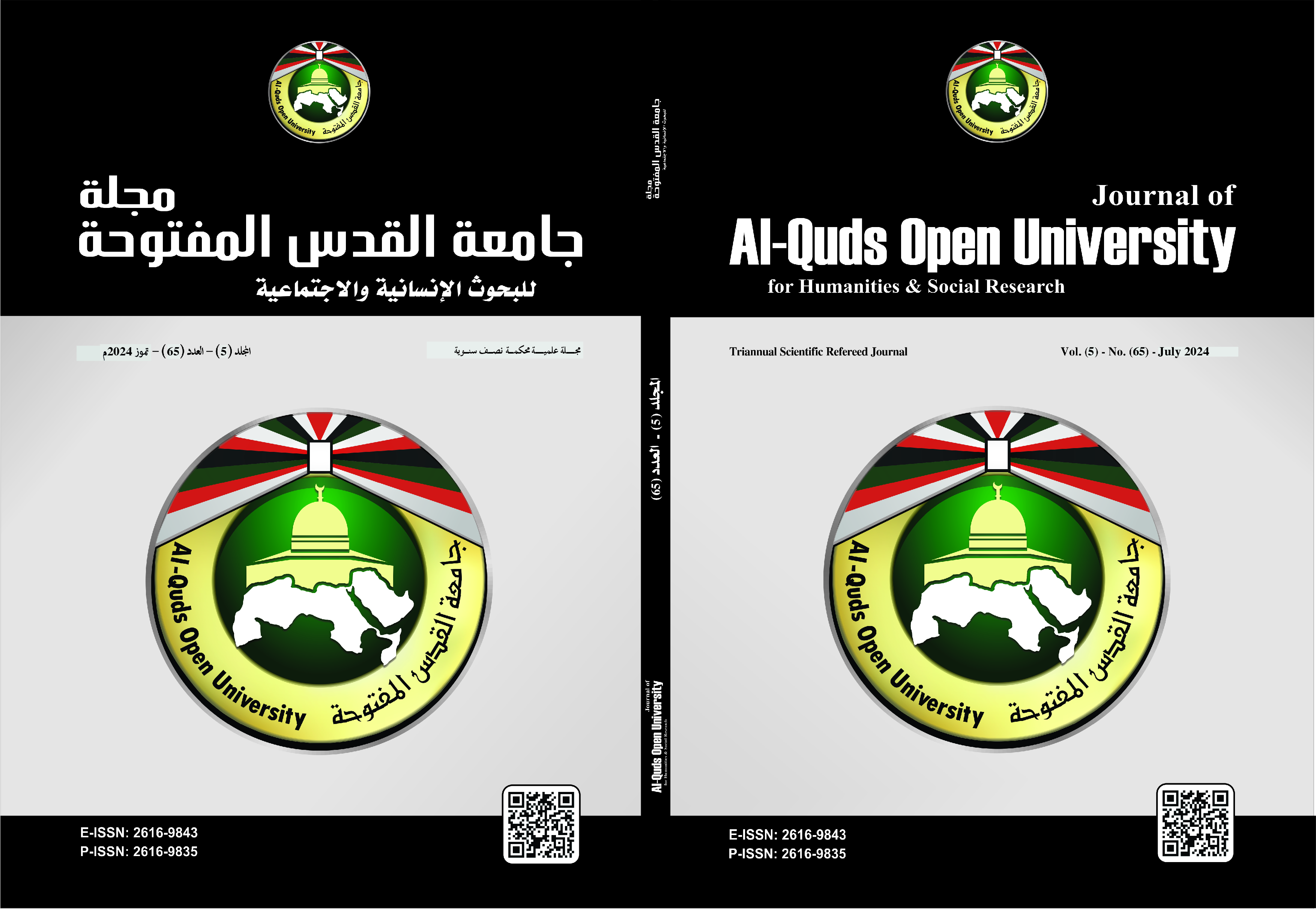Ra’eyyat Omar Ibn Abi Rabia’ah Pragmatism approach
DOI:
https://doi.org/10.33977/0507-000-065-010Keywords:
Pragmatics, discourse, Omar bin Abi RabiaAbstract
Pragmatics, as a critical field, includes, in addition to the text, its creator and its recipients, as well as its environment and time. Thus, it serves as a comprehensive framework encompassing these elements. This research focuses on studying the famous vision of Umar ibn Abi Rabi'ah within the framework of pragmatics, in an attempt to uncover the text's indications and delve into its depths through analysis according to the descriptive-analytical method and within the contexts that the concept of contextual pragmatics.
Objectives of the study: Analysis of Omar bin Abi Rabi’ah’s opinion based on a ruling on pragmatics, hukmiyyat al-hukm, and ruling
Methodology: This research came in two sections: The first: The general foundational frameworks for pragmatics and speech acts. The user: The contextual membership in the vision of Omar bin Abi Rabia. The results of this research were as follows:
Results: 1. Omar bin Abi Rabia’s narrator carries semantic dimensions that cannot be understood outside the pragmatic understanding that includes the elements of the discourse.
2. Through pragmatic analysis of texts, It is possible to reveal the text’s references, metaphors, and ambiguities.
Conclusion: The research focused on understanding the opinion of Omar bin Abi Rabia in the context of pragmatics and the theory of speech acts, and concluded with a number of results and recommendations.
References
المَصادر والمَراجع باللغة العربية:
أرمينكو، فرانسواز، المقاربة التداولية، ترجمة: سعيد علوش، مركز الإنماء القومي، دط، دت، المغرب.
بلخير، عمر، نظرية الأفعال الكلامية وإعادة قراءة التراث العربي، مجلة الأثر، عدد خاص أشغال الملتقى الدولي الثالث في تحليل الخطاب، الجزائر، ج1، ص 67-75.
بوجادي، خليفة. (2009). في اللسانيات التداوليَّة، مع محاولة تأصيليَّة في الدرس العربي القديم، ط1، بيت الحكمة للنشر والتوزيع، الجزائر.
بن بوفلجة، محمد. (2019). الأبعاد التداوليَّة في توجيه الخطاب الدعويّ في القرآن الكريم، مُقاربة في آليَّات الحجاج وبلاغة الإقناع، رسالة دكتوراة غير منشورة، جامعة جيلالي ليابس/ سيدي بلعباس، الجزائر.
سليمان، فتح الله. (2004). الأسلوبيَّة، مدخلٌ نظريٌّ ودراسةٌ تطبيقيَّة، مكتبة الآداب، القاهرة.
شاهين، أحمد. (2015) النظريَّة التداوليَّة وأثرُها في الدِّراسات النحويَّة المُعاصرة، عالم الكتب الحديث، الأردن.
علوي، حافظ. (2011). علم استعمال اللغة، ط1، عالم الكتب الحديث، الأردن.
علي، محمد. (2004). مقدمة في علمي الدلالة والتخاطب، ط1، دار الكتاب الجديدة المتحدة، بيروت.
عمر، أحمد. (1998). علم الدلالة، ط5، عالم الكتب، القاهرة.
عيساوي، خالد. (2015). الخطاب الإشهاريّ بيْن البُعد التداوليّ وسلطة النَّص، بحث منشور ضمن كتاب: التداولية ظلال المفهوم وآفاقه، عالم الكتب الحديث، القاهرة.
صراف، على. (2010). في البراغماتية، الأفعال الإنجازية في العربية المعاصرة، دراسة دلالية ومعجميَّة سياقيّة، ط1، مكتبة الآداب، القاهرة.
مسدِّي، عبد السلام. (1982). الأسلوبيَّة والأسلوب، ط3، الدار العربية للكتاب، ليبيا.
متوكل، أحمد. (2010). اللسانيات الوظيفيَّة، مدخل نظري، ط2، دار الكتاب الجديد المتحدة، بيروت.
متوكل، أحمد. (2006). المنحى الوظيفي في الفكر اللغويّ العربي، ط1، الأصول والامتداد، دار الأمان، الرباط.
نحلة، محمود. (2002). آفاق جديدة في البحث اللغوي المعاصر، (دط)، دار المعرفة الجامعية، الإسكندرية.
References:
Armenco, Françoise, The Pragmatic Approach (in Arabic), translated by: Saeed Alloush, National Development Center, DT, DT, Morocco.(in Arabic)
Ali, Muhammad (2004). Introduction to the Sciences of Semantics and Communication (in Arabic), 1st edition, New United Book House, Beirut. .(in Arabic)
Alawi, Hafez. (2011). Science of Language Use (in Arabic), 1st edition, Modern World of Books, Jordan. .(in Arabic)
Belkheir, Omar, The Theory of Speech Acts and Rereading the Arab Heritage (in Arabic), Al-Athar Magazine, special issue, Proceedings of the Third International Forum on Discourse Analysis, Algeria, vol. 1, pp. 67-75..(in Arabic)
Boujadi, Khalifa. (2009). In pragmatic linguistics, with an authentic attempt in the ancient Arabic lesson (in Arabic), 1st edition, House of Wisdom for Publishing and Distribution, Algeria. (in Arabic)
Bin Bouflaja, Muhammad. (2019). Pragmatic dimensions in directing advocacy discourse in the Holy Qur’an, an approach to the mechanisms of pilgrims and the rhetoric of persuasion (in Arabic), unpublished doctoral thesis, Djilali Liabes University/Sidi Bel Abbes, Algeria..( in Arabic)
Issawi, Khaled. (2015). Advertising discourse between the pragmatic dimension and the authority of the text (in Arabic), research published in the book: Pragmatics: Shades of the Concept and Its Horizons, Modern World of Books, Cairo. (in Arabic)
Mutawakkil, Ahmed. (2010). Functional linguistics, a theoretical introduction (in Arabic), 2nd edition, United New Book House, Beirut. .( in Arabic)
Mutawakkil, Ahmed. (2006). The Functional Orientation in Arabic Linguistic Thought (in Arabic), 1st edition, Origins and Extension, Dar Al-Aman, Rabat. ( in Arabic)
Masadi, Abdul Salam. (1982). Stylistics and style (in Arabic), 3rd edition, Arab Book House, Libya. (in Arabic) Nahla, Mahmoud. (2002). New Horizons in Contemporary Linguistic Research (in Arabic), (Ed.), University Knowledge House, Alexandria. .( in Arabic)
Omar, Ahmed. (1998). Semantics (in Arabic), 5th edition, Alam al-Kutub, Cairo. (in Arabic)
Suleiman, Fathallah. (2004). Stylistics, a theoretical introduction and applied study (in Arabic), Library of Arts, Cairo.(in Arabic)
Shaheen, Ahmed. (2015) Pragmatic theory and its impact on contemporary grammatical studies (in Arabic), Modern World of Books, Jordan. (in Arabic)
Sarraf, Ali. (2010). In Pragmatics, Performative Verbs in Contemporary Arabic, A Contextual Semantic and Lexical Study (in Arabic), 1st edition, Library of Arts, Cairo. (in Arabic)
Downloads
Published
How to Cite
Issue
Section
License
Copyright (c) 2024 Journal of Al-Quds Open University for Humanities and Social Studies

This work is licensed under a Creative Commons Attribution 4.0 International License.
- The editorial board confirms its commitment to the intellectual property rights
- Researchers also have to commit to the intellectual property rights.
- The research copyrights and publication are owned by the Journal once the researcher is notified about the approval of the paper. The scientific materials published or approved for publishing in the Journal should not be republished unless a written acknowledgment is obtained by the Deanship of Scientific Research.
- Research papers should not be published or republished unless a written acknowledgement is obtained from the Deanship of Scientific Research.
- The researcher has the right to accredit the research to himself, and to place his name on all the copies, editions and volumes published.
- The author has the right to request the accreditation of the published papers to himself.













_2.png)
_.png)
_2.png)
_1.png)
_.png)

